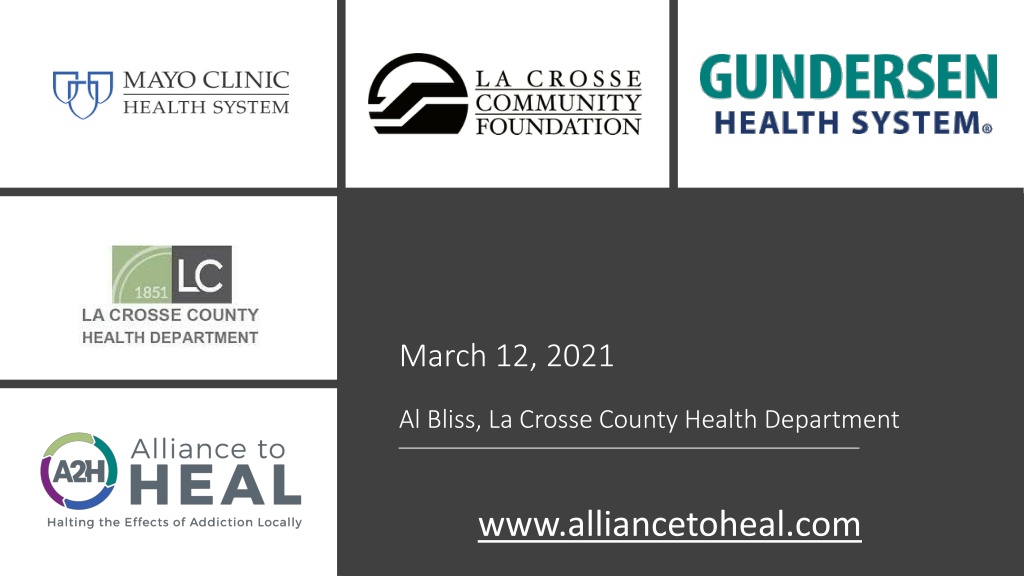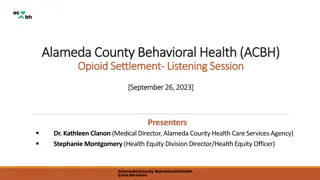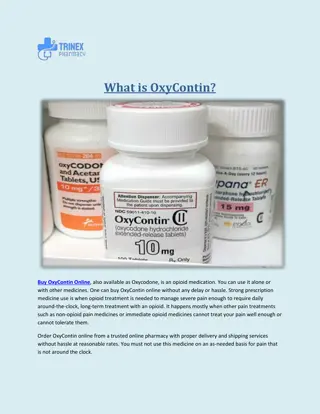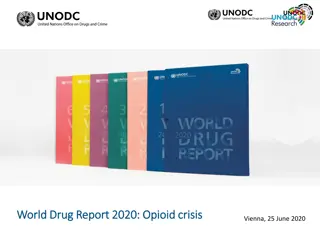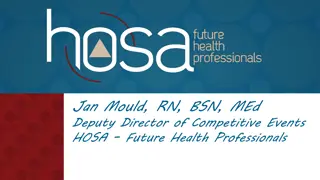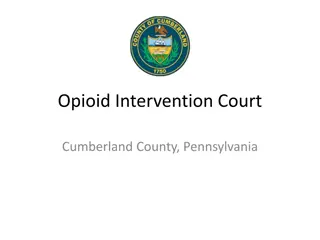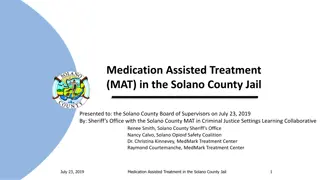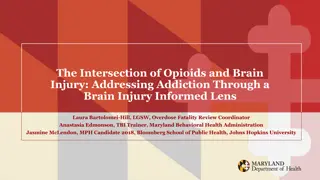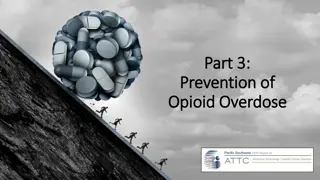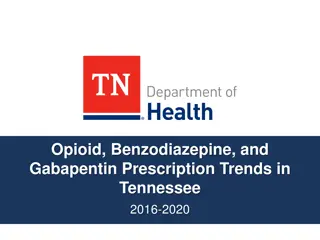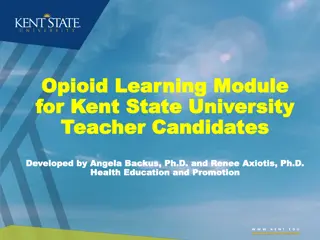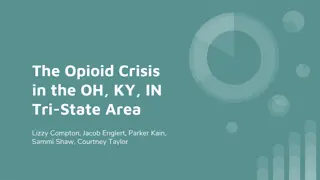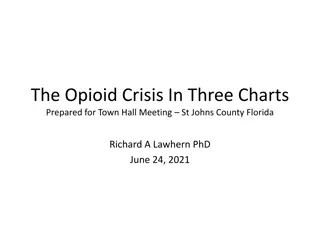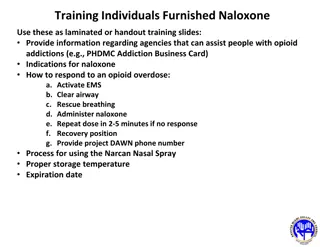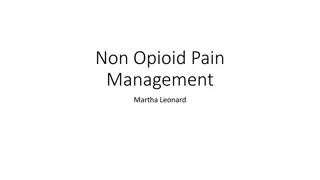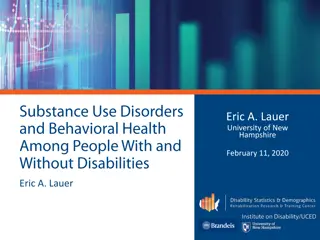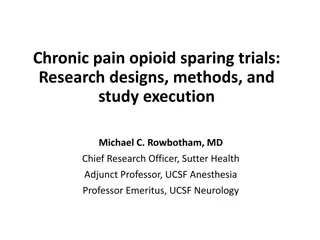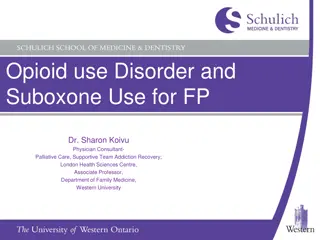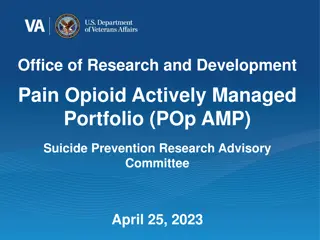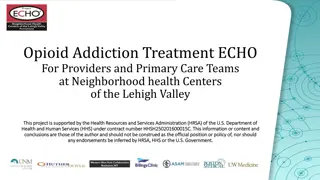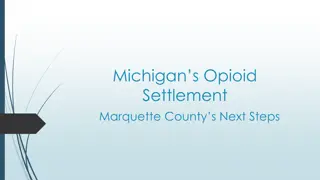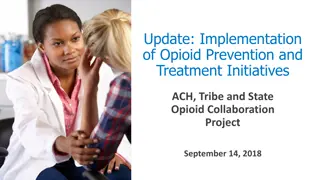Opioid Crisis and Prevention Efforts in La Crosse County
La Crosse County is tackling the opioid crisis through the Alliance to HEAL initiative, aiming to limit opioid supply, raise awareness, and reduce addiction, deaths, and crime. Data shows drug overdose deaths and opioid use trends from 2014 to 2020, highlighting the need for collaborative efforts to address prescribing practices, education, and high-risk individuals for opioid use disorder.
Download Presentation

Please find below an Image/Link to download the presentation.
The content on the website is provided AS IS for your information and personal use only. It may not be sold, licensed, or shared on other websites without obtaining consent from the author.If you encounter any issues during the download, it is possible that the publisher has removed the file from their server.
You are allowed to download the files provided on this website for personal or commercial use, subject to the condition that they are used lawfully. All files are the property of their respective owners.
The content on the website is provided AS IS for your information and personal use only. It may not be sold, licensed, or shared on other websites without obtaining consent from the author.
E N D
Presentation Transcript
March 12, 2021 Al Bliss, La Crosse County Health Department www.alliancetoheal.com
Alliance to HEAL Alliance to HEAL - - Goals Goals 1. Limit the supply of opioids in our community 2. Raise awareness of the risk of opioid use disorder 3. Reduce opioid-related addiction, deaths, and crime in our communities 4. Create a readily accessible, coordinated, systemic response that increases treatment capacity and enhances the prevention, treatment, and recovery continuum
Drug Overdose Deaths in La Crosse County 2014 Drug Overdose Deaths in La Crosse County 2014 - - 2020 2020 DRUG DEATHS HEROIN FENTANYL CARFENTANYL Rx OPIOIDS METH COCAINE THC Other Rx Alc YR 2014 9 0 0 0 5 1 2 2 3 2015 12 0 0 0 8 3 0 1 2 2016 21 3 4 0 19 7 2 6 2 2017 29 8 15 1 8 9 1 9 6 2018 24 11 16 0 2 9 4 5 4 2019 6 22 9 12 0 2* 11 2 2 2 Trazodone and amphetamine 11 Methadone and fentanyl 2 * methadone 2020 40 5 5 27 0 21 3 1 Source:La Crosse County Medical Examiner s Department For Good. Forever.
Opioid (Prescription and Heroin) Drug Use/Abuse La Crosse County Residents 2016-2020 (Hospitalizations & Emergency Room Use Combined) MCHS and GHS Combined 600 510 500 413 400 334 2016 2017 300 251 241 2018 2019 200 2020 100 0 Opioids (Both Rx and Heroin)
Drug Use/Abuse La Crosse County Residents 2016-2020 (Hospitalizations & Emergency Room Use Combined) MCHS and GHS Inhalant Hallucinogen 500 Sedative & Hypnotic Cocaine Other Psychoactive 400 Other Stimulant Cannabis 300 Opioid 200 100 0 2016 2017 2018 2019 2020
10 10 work work groups groups 115 members For Good. Forever. 7
Driver Diagram Secondary Drivers Active Work Groups Improve Prescribing Practices Provider Education Assess for individuals at high risk for opioid use disorder Primary Drivers Work Group 1 Improve prescribing practices/provider education/identify and educate patients at high risk of developing opioid use disorder Outcomes Limit the supply of opioids Improve Dispensing Practices Prevent Diversion of unused opioids Reversing the Opioid Crisis in Our Community Work Group 2 Diversion of Opioids Availability of alternative pain management treatment Work Group 3 Alternative Pain Management Prevent opioid use disorder - Raise awareness of the risk of opioid use disorder Adolescent Education Community Education Reduce stigma around substance abuse and opioid use and disorder Educate patients about expectations for pain and pain management Work Group 4 Adolescent Measures: Work Group 4C - Community Education Decreased Fatal Overdose Rate Work Group 5 Uniform Assessment and Navigation Uniform screening for patients at high risk for developing opioid use disorder Uniform shared assessment of individuals with opioid use disorder No wrong door access into treatment system Identify/assess individuals at high risk for opioid use disorder Decrease Non-fatal Overdose Rate Work Group 6 Improve Funding for Residential Treatment/medical based detox center Increase Individuals in Treatment Work Group 7 A. Enhance Capacity of MAT B. MAT in Jail Improve availability of detox/ treatment facilities Enhance capacity of MAT Enhance restorative justice system Enhance Robust Recovery Community Increase naloxone availability Treat individuals opioid use disorder Work Group 8 Enhance availability of support services during and after treatment Decrease Supply of Opioids Work Group 9 Increase Naloxone availability Work Group 10 Policy Group
Workgroup 5 Navigation & Assessment Secondary Drivers: Uniform screening for patients at high risk for developing opioid use disorder Uniform shared assessment of individuals with opioid use disorder No wrong door access into treatment system Objectives/Focus: Navigator Position Grants? CHW? Opioid Grant? Explore training to help improve system connection in existing system- addressing GAPS (helping with no wrong door) Improved coordination among providers Lead to identifying system changes that could help Ongoing: assessing and evaluating gaps in the system and finding solutions Group continues to do data collection (real time) Evaluate data and propose solutions Make requests to address as appropriate Detox advocacy
Workgroup 7 Medicated Assisted Treatment Secondary Driver: Enhance Capacity of MAT (Jail and Community) Objectives: Reduce interruptions in MAT services among La Crosse County jail inmates Improve access/waiting time for community MAT (New) Onboarding or starting MAT for inmates who are currently not on MAT (New) Improve MAT services and follow up upon release and after (90 days)
Workgroup 8: Sober Living Secondary Driver: Enhance Robust Recovery Community / Enhance availability of support services during and after treatment Objectives/Focus Implement new ways of service of recovery services during pandemic (telehealth/virtual/phone cards/expand hours for connecting peer recovery with County Justice Support Services/Drug Court) Improve access to sober living (leave no one behind for housing) Consider 3rd party provider for sober living coaches with clients, collaborate
Alliance to HEAL Highlights in 2020 Distributed more than 800 doses of Narcan to law enforcement, emergency room depts., fire departments and other agencies Collected over 4,200 pounds of improperly disposed of needles Continued collection of prescription drugs Worked with treatment providers to encourage changes in treatment and recovery services, including offering virtual meetings and improved connection of peer recovery coaches with providers and those seeking substance use and mental health services Collaborated with Viterbo University to offer over 100 professionals and community members a training summit on opioids, substance use, and mental health Reduced interruptions in the La Crosse County jail for inmates on medicated assisted treatment by 75 percent Community support of a navigator position in 2021 to link clients more seamlessly to services and with less wait times to improve access to substance use treatment Collaborated with the Overdose Fatality Review Team to develop recommendations to reduce drug overdose deaths Developed a parent toolkit to reduce substance use among adolescents and increased awareness of services for help Developed a resource guide for alternative pain management
Upcoming Events & Resources Next Alliance to HEAL meeting is Thursday, March 25 Next Alliance to HEAL meeting is Thursday, March 25th th from 2:30 Website: www.alliancetoheal.com from 2:30- -4:30pm 4:30pm - - Virtual meeting MS Teams link Guest Speakers: Shy Jackson, Director of Operations, and Shamawyah Curtis, Director of Development, and co-founders of Hope Restores in La Crosse, WI. Hope Restores Corporation is a non-profit 501(C)(3) organization aimed at uplifting, empowering and restoring the African American community through education, preservation and advocacy. Brothers Battling Barriers is a program that serves as a support group for black men; fighting addictions, reconnecting with family, networking, parenting, relationship tools, and general wellness. Our mission is to empower the black male to help change the family dynamic. The Wisconsin 2021 Opioids, Stimulants, and Trauma Summit The Wisconsin 2021 Opioids, Stimulants, and Trauma Summit will be presented over three days. Each day will feature a keynote presentation followed by three concurrent workshops. April 16, 2021: April 16, 2021: 8:30 a.m. to 12:00 p.m. May 14, 2021: May 14, 2021:8:30 a.m. to 12:00 p.m. June 18, 2021: June 18, 2021:8:30 a.m. to 12:00 p.m. All participants will be required to register. The registration fee will be $50 per day or $125 for all three days. CEHs/CEUs will be available.
